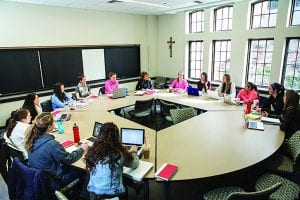May 11, 2014
The new face of Western Civ
By Vicki-Ann Downing
The discordant sounds of ragtime music filled a lecture hall in the Ruane Center for the Humanities, where the Apple TV displayed Picasso’s painting Les Demoiselles d’Avignon. For sophomores in a course called The Ideology of Crisis, the music and art illustrated the changing, uncertain times before World War I, when underlying racism and sexism belied the nation’s prosperity.
In The History and Science of Food, meanwhile, students explored corn — first by building models of its molecular structure; then by learning its uses as a plastic, a fuel, and a sweetener in industrialized America; and finally by considering its impact on Mexican history, where the Aztecs prayed to it, Spanish conquerors looked down upon it, and nationalists made it a symbol of pride.
The two courses were among the 25 new colloquia offered this spring to sophomores in their fourth and final semester of the Development of Western Civilization Program, the cornerstone of a Providence College liberal arts education since 1971.
“Civ” got a sharply new look this academic year with the opening of the Ruane Center for the Humanities. Lecture sizes are smaller, seminars are a focus, and professors from all sorts of disciplines are teaching. Especially intriguing is the fourth semester, where students apply their studies of great books and traditional topics from the first three semesters to a contemporary topic in a colloquium of their choosing.

Twenty-eight professors from the traditional DWC disciplines of theology, history, English, and philosophy teamed with 18
professors from other disciplines to teach the colloquia. The new recruits include seven from the School of Business, three from the sciences, and others from art and art history, music, economics, global studies, health policy and management, political science, and sociology.
The ideas for the colloquia were imaginative and varied. A political science professor and an engineering-physics-systems professor created The Science and Politics of Energy: Past, Present, Future. A sociology professor and an English professor paired to teach Contemporary New Orleans and the Arts of Resistance. In From Childhood to Community, a course taught by professors from theology and philosophy, reading material ranged from Dr. Seuss to Nietzsche.
When an appeal went out to professors, “I was surprised by what a great response we got,” said Dr. Vance G. Morgan, professor of philosophy and director of the DWC Program. “It’s one thing to say that an idea looks interesting and another to do it. It took a great deal of commitment on the part of faculty.”
To prepare to teach Civ, the professors were offered intensive development in four 90-minute workshops last fall. Veteran faculty explained the “nuts and bolts” of the program. Special emphasis was given to how to lead a discussion seminar, a practice unfamiliar to professors in business and the sciences.
“I say we’ve been given a gift, an opportunity,” said Dr. Christine E. Earley, professor of accountancy and associate dean of the School of Business, who teaches The Ideology of Crisis. “It’s good for the students, and it really does engage the faculty.” Having business faculty teach in the liberal arts “is something that sets PC apart from everyone else,” she said.
From all accounts, the colloquia are a success, said biology major Morgan McCarthy ’16 (South Glastonbury, Conn.).
The History and Science of Food “is interesting to learn about in the fourth semester because science usually isn’t incorporated into Civ,” said McCarthy. “Having a class with a chemistry professor and a history professor, as well as students from a variety of majors, lets everyone contribute ideas and learn from each other. In the history aspect of this course, we can learn about non-Western cultures that also have a big impact on societies but aren’t usually included in Civ.”
“It’s intellectually rigorous,” added Dr. Kathleen A. Cornely, professor of chemistry. “It’s not a fluff class. They are thinking critically.”





